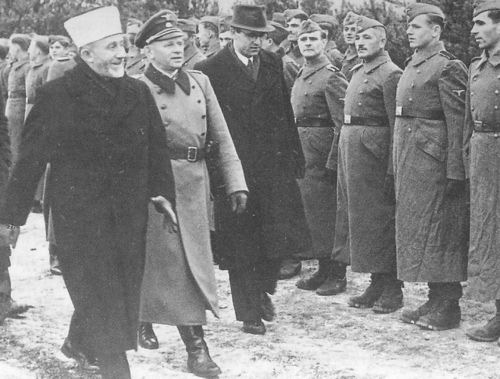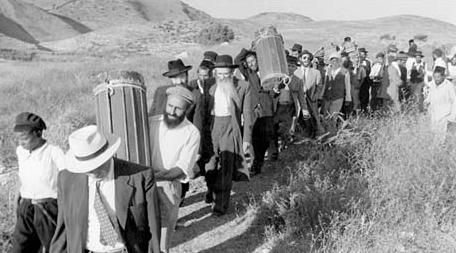Jewish refugees from Arab lands: are they an issue, 60 years on?

Jews of Mosul.
This year is the 2,600 the anniversary of the Babylonian Exile, when Jews were taken into captivity following the destruction of the first Jerusalem Temple. Some of those Jews stayed on to become the oldest diaspora in modern-day Iraq. But sadly, only four remain of this once glorious community. It is the same story across the Arab world.
How many people know of the modern-day exodus of Jews from Iraq and from nine other Arab countries?
In the last 65 years, Jews have been forced to leave their homes in their hundreds of thousands, some at gunpoint with nothing but the clothes on their backs. Many who fled were put in refugee camps. Those who stayed behind were trapped as hostages, arrested, jailed and even murdered. Today there are fewer than 4,500 Jews left in the Arab world.
By the time the Arabs had conquered land largely inhabited by Jews and Christians in the 7th century, the Jews had been settled there for 1,000 years. People in the West tend to apply a common misconception to all Jews, borrowing the Christian notion that Jews were guests or recent immigrants. But not only have Jews always lived in Palestine, there was continuity of Jewish settlement in the Middle East and North Africa for 2,000 years.
The Ibn Danan Synagogue, Fez, Morocco
One of the oldest and most important synagogues in North Africa. Originally built and owned by a prominent Moroccan Jewish family in the mid-seventeenth century.
Since the start of the Arab-Israeli conflict, more Jews fled Arab countries than Arabs fled Palestine. Today 99.5% have been forced out of their countries of birth. As the historian Nathan Weinstock has observed, not even the Jews of 1939 Germany had been so thoroughly “ethnically cleansed”.
The displacement of Jews from Arab countries was not just a backlash to the creation of Israel and the Arabs’ humiliating defeat. The “push” factors were already in place. Arab League states drafted a law in November 1947 branding their Jews as enemy aliens. But non-Muslim minorities, historically despised as ‘dhimmis’ with few rights, were already being oppressed by Nazi-inspired pan-Arabism and Islamism. These factors sparked the conflict with Zionism, and drive it to this day.

IslamoNazi pan-Arab pan-Islam leader, the Mufti al-Husseini.
The Jewish “Nakba” – Arabic for “catastrophe” – not only emptied cities like Baghdad (a third Jewish); it tore apart the cultural, social and economic fabric in Arab lands. Jews lost homes, synagogues, hospitals, schools, shrines and deeded land five times the size of Israel. Their ancient heritage – predating Islam by 1,000 years – was destroyed.
My own parents were forced to leave Iraq in 1950. Jews were being executed for being ‘Zionists’. They could be arrested for having Hebrew books in their homes. Money was extorted from Jews to pay for the war in Palestine. Jews could not work, travel and pursue higher education. Above all, they feared a repeat of the 1941 Farhud pogrom, in which 180 Jews were murdered. Jews were smuggling themselves out of the country in ever larger numbers. In 1950, the Iraqi government finally consented to allow Jews to leave. Ninety percent did, but within a year their assets were seized. My family was dispersed to the UK, France, the US, Canada and Iran. My uncle in Iran had to flee a second time following the 1979 Islamic revolution.
We are lucky to have a Jewish state which took most of the Jewish refugees from Arab countries. Some 650,000 and their descendants are now living in freedom and as full citizens. Israel is both a response to Arab antisemitism, and the legitimate political expression of an indigenous Middle Eastern people. Half of Israel’s Jewish population descends from refugees from Arab and Muslim lands.
Arab governments have never admitted committing mass violations of Jewish human and civil rights, much less apologised or offered restitution. Over 120 UN resolutions deal with the 711,000 Palestinian refugees; not one refers to the greater number of Jewish refugees. Although peace initiatives have been worded to refer generically to the “refugee problem”, Jewish and Arab, Israel has been reluctant to politicise the Jewish refugee issue, having successfully integrated them as full citizens: Arab denial has thus conspired with Israeli silence to airbrush Jewish refugees out of the picture, leading to obfuscation, distortion and decontextualisation.
 Are these refugees, who have successfully rebuilt their lives in Israel and the West, still an issue 60 years on?
Are these refugees, who have successfully rebuilt their lives in Israel and the West, still an issue 60 years on?
Yes, they are – now more than ever.
The first reason is that even after 60 years, the Palestinians are still insisting on their ‘right of return’. Borders can be agreed, Jerusalem can even be divided, but the Palestinians will never abandon their goal of turning Israel into an Arab-majority state by flooding it with millions of refugees. The numbers of Palestinians who consider themselves refugees have increased by leaps and bounds to over 4 million. This is because Palestinians, unique among all refugees, are permitted by the UN to pass on their refugee status from generation to generation. As long as Palestinians cling to their ‘right of return’, we must remind them that a greater number of Jewish refugees left Arab countries in what amounts to an exchange of populations.
The second reason is that the successful absorption in Israel and the West of Jewish refugees provides a model for the Arab states with Palestinian refugees to follow. Except in Jordan, and in much of the Arab world, Palestinian refugees and their descendants are denied citizenship, jobs and the right to own property.

The third reason is that the Jewish refugees issue is central to the fight against the delegitimisation of Israel. They are living proof that Jews are not colonial interlopers, but indigenous to the region. Moreover, they are central to understanding the Arab and Muslim world’s deep religious and cultural resistance to the idea of a Jewish state. For 14 centuries Jews lived under Muslim rule as dhimmis – inferior subjects with few rights and little security.
The fourth reason is that the plight of Jews uprooted from the Middle East and North Africa is more relevant than ever to the plight of other non-Arab and non-Muslim minorities in the region. The rise of Islamism, particularly since the Arab Spring, has seen an upsurge of violence and discrimination against Christians. But the Jews have been through it all before. As the saying goes, first the Saturday people, then the Sunday people.
Some Middle East Christians admit they are envious that Jews have Israel – a refuge from persecution which they lack. In spite of the pain of their uprooting, Jews are better off in Israel and the West than they ever in the Arab world. In spite of instances of discrimination, they enjoy freedom and civil and human rights. They don’t want to be allowed to return to unsafe and viciously anti-Jewish Arab countries. But they do want their ‘narrative’ of displacement and dispossession to be recognised, and the grave injustices committed against them by Arab countries acknowledged.
Only by restoring Jewish refugees into the picture will people get an undistorted idea of the facts of the Arab-Israeli conflict. The truth, in turn, should promote mutual understanding and eventual reconciliation between Jews and Arabs.

Any Israeli leader promoting the uprooting of Jewish Towns, Villages or Settlements is a traitor to the people of Israel
ReplyDeleteAny Israeli leader promoting the uprooting of Jewish Towns, Villages or Settlements is a traitor to the people of Israel
ReplyDelete